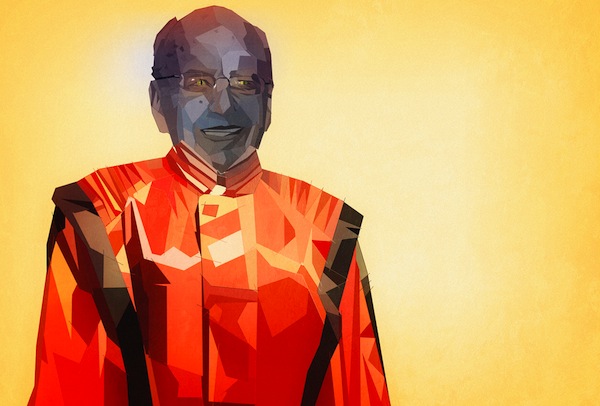

Fresh accusations and denials for News Corp.: After several months of investigation, News Corp.’s Rupert Murdoch and his son, James, testified this week before the British government’s Leveson inquiry into their company’s phone hacking and bribery scandal. Rupert made headlines by apologizing for his lack of action to stop the scandal and by admitting there was a cover-up — though he said he was the victim of his underlings’ cover-up, not a perpetrator himself (a charge one of those underlings strenuously objected to).
Murdoch also said he “panicked” by closing his News of the World newspaper last year, but said he should have done so years earlier. He spent the first day of his testimony defending himself against charges of lobbying public officials for favors, saying former Prime Minister Gordon Brown “declared war” on News Corp., which Brown denied. James Murdoch also testified to a lack of knowledge of the scandal and cozy relationships with officials.
Attention in that area quickly shifted this week to British Culture Minister Jeremy Hunt, with emails released to show that he worked to help News Corp. pick up support last year for its bid to takeover the broadcaster BSkyB — the same bid he was charged with overseeing. Hunt called the accusation “laughable” and refused calls to resign, though one of his aides did resign, saying his contact with News Corp. “went too far.”
The commentary on Murdoch’s appearance was, perhaps surprisingly, mixed. The Washington Post’s Erik Wemple mocked the fine line Murdoch apparently walked in his currying favor from public officials, and the Guardian’s Nick Davies said Murdoch looks vulnerable: “The man who has made millions out of paying people to ask difficult questions, finally faced questioners he could not cope with.” He antagonized quite a few powerful people in his testimony, Davies said, and the Leveson inquiry ultimately holds the cards here.
But Murdoch biographer Michael Wolff said Rupert doesn’t use his newspapers to gain officials’ favor in the way he’s accused of doing, and Reuters’ Jack Shafer argued that there’s nothing really wrong with lobbying regulators to approve your proposals anyway. “Don’t damn Murdoch for learning the rules of the regulatory game and then playing them as aggressively as he can,” he wrote.

Plagiarism and aggregation at the Post: A Washington Post blogger named Elizabeth Flock resigned last week after being caught plagiarizing, but the story went under the radar until the Post’s ombudsman, Patrick Pexton, wrote a column charging the Post with failing to properly guide its youngest journalists. Pexton said he talked with other young Post aggregators who “felt as if they were out there alone in digital land, under high pressure to get Web hits, with no training, little guidance or mentoring and sparse editing.”
Poynter’s Craig Silverman wrote a strong follow-up to the column, talking to several people from the Post and emphasizing the gravity of Flock’s transgression, but also throwing cold water on the “journalism’s standards are gone, thanks to aggregation” narrative. Reuters’ Jack Shafer thought Pexton went too easy on Flock’s plagiarism, but others thought it was the Post he wasn’t hard enough on. The Awl’s Trevor Butterworth said Flock’s mistake within the Post’s aggregation empire shed light on the “inherent cheapness of the product and the ethical dubiety of the entire process. You see, the Post—or any legacy news organization turned aggregator—wants to have its cake and other people’s cake too, and to do so without damaging its brand as a purveyor of original cake.”
BoingBoing’s Rob Beschizza made the same point, criticizing the Post for trying to dress up its aggregation as original reporting. The Raw Story’s Megan Carpentier used the example as a warning that even the most haphazard, thoughtless aggregated pieces have a certain online permanence under our bylines.

Technology, connection, and loneliness: A week after an Atlantic cover story asked whether Facebook was making us lonely (its answer: yes), MIT professor and author Sherry Turkle echoed the same point last weekend in a New York Times opinion piece. Through social and mobile media, Turkle argued, we’re trading conversation for mere connection, sacrificing self-reflection and the true experience of relating with others in the process.
Numerous people disputed her points, on a variety of different fronts. Cyborgology’s David Banks charged Turkle with “digital dualism,” asserting that “There is no ‘second self’ on my Facebook profile — it’s the same one that is embodied in flesh and blood.” At The Atlantic, Alexandra Samuel said Turkle is guilty of a different kind of dualism — an us/them dichotomy between (generally younger) social media users and the rest of us. Turkle, she wrote, “assumes conversations are only meaningful when they look like the conversations we grew up having.”
Like Banks, Mathew Ingram of GigaOM pointed out the close connection between online and offline relationships, and sociology prof Zeynep Tufekci argued at The Atlantic that if we are indeed seeing a loss in substantive interpersonal connection, it has more to do with our flight to the suburbs than social media. Claude Fischer of Boston Review disputed the idea that loneliness is on the rise in the first place, and in a series of thoughtful tweets, Wired’s Tim Carmody said the road to real relationship is in our own work, not in our embrace or denial of technologies.
 New media lessons from academics and news orgs: The University of Texas hosted its annual International Symposium on Online Journalism last weekend, one of the few of the scores of journalism conferences that brings together both working journalists and academics. As usual, University of British Columbia j-prof Alfred Hermida live-blogged the heck out of the conference, and you can see his summaries of each of his 14 posts here.
New media lessons from academics and news orgs: The University of Texas hosted its annual International Symposium on Online Journalism last weekend, one of the few of the scores of journalism conferences that brings together both working journalists and academics. As usual, University of British Columbia j-prof Alfred Hermida live-blogged the heck out of the conference, and you can see his summaries of each of his 14 posts here.
Several people distilled the conference’s many presentations into a few themes: The Lab’s staff identified a few, including the need to balance beauty and usefulness in data journalism and the increasing centrality of mobile in news orgs’ strategies. At the Nonprofit Journalism Hub, conference organizer Amy Schmitz Weiss organized the themes into takeaways for news orgs, and Wisconsin j-prof Sue Robinson published some useful notes, organized by subject area.
A couple of specific items from the conference: The Lab’s Adrienne LaFrance wrote on a University of Texas study that found that the people most likely to pay for news are young men who are highly interested in news, though it also found that our stated desires in news consumption don’t necessarily match up with our actual habits. And Dan Gillmor touted the news-sharing potential of one of the conference’s presenters, LinkedIn, saying it’s the first site to connect news sharing with our professional contacts, rather than our personal ones.
[Editor’s note: Mark’s too modest to mention the paper he coauthored and presented at ISOJ.]
Reading roundup: Several interesting debates lurked just a bit under the radar this week. Here’s a quick lay of the land:
— Reuters’ Felix Salmon wondered why the New York Times doesn’t sell early access to its big business scoops to hedge funds looking for a market advantage, as Reuters and Bloomberg do. GigaOM’s Mathew Ingram argued that the public value of those is too great to do that, and Salmon responded to his and others’ objections. The conversation also included a lively Twitter exchange, which Ingram and the Lab’s Joshua Benton Storified.
— The Chicago Tribune announced its decision to outsource its TribLocal network of community news sites to the Chicago company Journatic, laying off about 20 employees in the process. The Chicago Reader and Jim Romenesko gave some more information about Journatic (yes, the term “content farm” comes up, though its CEO rejected the term). Street Fight’s Tom Grubisich called it a good deal for the Tribune.
— In a feature at Wired, Steven Levy looked at automatically written stories, something The Atlantic’s Rebecca Greenfield said she didn’t find scary for journalism’s future prospects, since those stories aren’t really journalism. Nebraska j-prof Matt Waite also said journalists shouldn’t be afraid of something that frees them up to do their jobs better, and GigaOM’s Mathew Ingram tied together the Journatic deal and the robot journalism stories to come up with something a bit less optimistic.
— This week on the ebook front: A good primer on the U.S. Department of Justice lawsuit of Apple and publishers for price-fixing, which The Wall Street Journal’s Gordon Crovitz said is a completely normal and OK practice. Elsewhere, some publishers are dropping digital rights management, and a publishing exec talked to paidContent about why they broke DRM.
— Gawker revealed its new commenting system this week — the Lab’s Andrew Phelps gave the background, Gawker’s Nick Denton argued in favor of anonymity, Dave Winer wanted to see the ability for anyone to write an article on it, and GigaOM talked with Denton about the state of tech.
— Google shut down its paid-content system for publishers, One Pass, saying it’s moved on to its Consumer Surveys.
— Finally, a few long reads for the weekend: David Lowery on artist rights and the new business model for creative work, Ethan Zuckerman on the ethics of tweet bombing, danah boyd on social media and fear, and Steve Buttry and Dan Conover on restoring newsroom morale.
Rupert Murdoch artwork by Surian Soosay and texting photo by Ed Brownson used under a Creative Commons license.